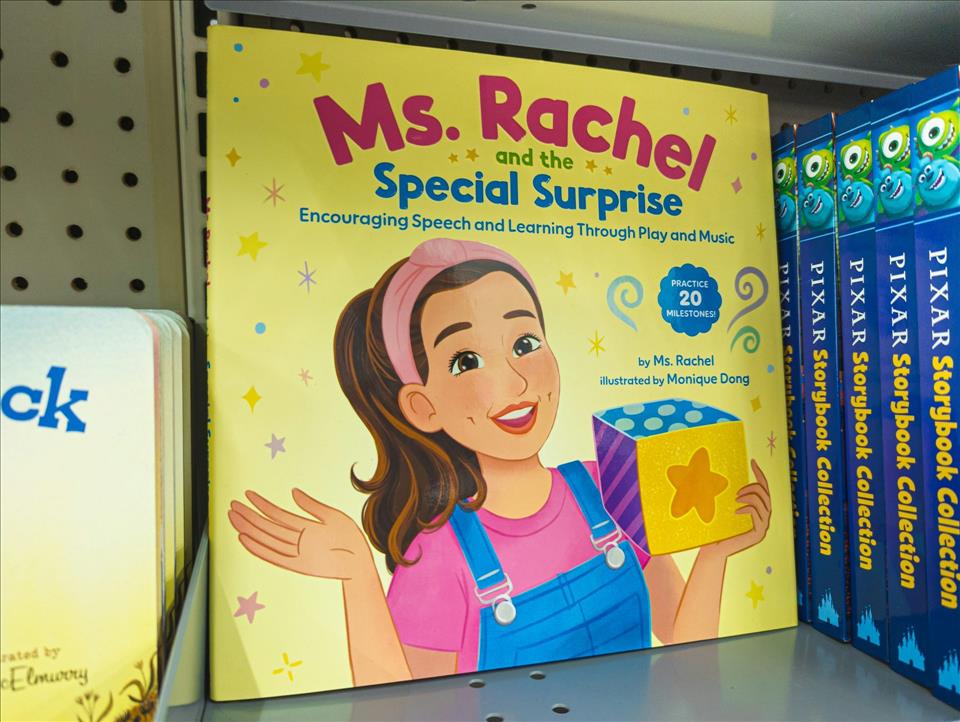
Songs For Littles: The Research That Explains Youtube Sensation Ms Rachel
But beyond the catchy tunes and pink overalls, research backs up why her videos are so effective, and why parents should consider joining in, not just letting their children watch.
For years, music therapists have studied how musical interaction supports early development. My own research has looked at how music can strengthen the bonds between parents and their children.
Before becoming a global phenomenon, Rachel Anne Accurso was a pre-school music teacher. When her son experienced a language delay, she sought speech therapy support and noticed a lack of resources for children needing help with language development.
Drawing on her teaching experience, she began creating small music classes tailored to early learners, which eventually became the online content we now know.
When the pandemic hit in 2020, parents were starved of social interactions for their children. Ms Rachel's videos – featuring her signature pink overalls, funky headbands and high-energy performances – became a lifeline for many.
Learn to Talk with Ms Rachel.
Her colourful videos offer engaging activities that parents and children can listen to and explore together. Simple musical games such as peek-a-boo and action songs encourage family playtime, while attractive graphics and high production standards make the channel very appealing.
Today, the channel has more than 11 billion views, while Ms Rachel herself is estimated to be worth US$6.5 million (£4.8 million).
So, why are her videos so appealing to children and effective for their development? Part of the answer lies in what psychologists call “communicative musicality” . Research has shown that early interactions between parents and infants are intrinsically musical.
'Parentese'Elements like rhythm, timing, pitch and phrasing are central to how babies and toddlers engage with the world. When adults speak to children, they instinctively use “parentese” . This is a higher-pitched, exaggerated style of speech with lively gestures and expressive faces. These cues capture attention and make learning fun. They help children absorb language naturally.
Ms Rachel's videos mirror these principles. Her songs are simple, repetitive and often interactive. They encourage children to respond, copy gestures or sing along.
The videos' structure, like predictable openings and closings, clear cues and pauses, support attention and help children feel secure while exploring language. Funny moments, surprises and lively expressions make the experience enjoyable, helping the children learn without it feeling like a lesson.
Baby's First Words with Ms Rachel.
Building on these musical connections can also help develop the bond between parents and child. My research in 2021 into the importance of parents singing with premature babies shows this.
Parents were excited to learn that their babies recognised their voices from before birth. The connection was already there and they just needed to build on it to keep the bond growing and developing.
UkraineIn 2022, a book I co-authored, looked at the benefits of group music therapy families with pre-school children displaced from Ukraine to the UK due to the war. Some children had speech delays or were struggling to socialise with their peers. In some cases, parents were struggling to bond with their children.
After eight weeks of small group music therapy sessions, significant changes began to take place. Parents reported not only language development but progress in sharing and playing with others as well as feeling more love for their children.
Music became a feature at home too. The songs the children learned became part of family life. Parents were making up their own songs too, about brushing teeth and getting ready for nursery. They realised that making these activities into a musical game made them special times that were full of fun.
Read more: Music therapy improves the health of premature babies and boosts parental bonding
What was important in the music therapy groups was to keep the format the same each week. The groups began with a“hello” song on the guitar, where every child was greeted by name. From this beginning, other songs were introduced.
There was time for improvised music with everyone playing and trying out new sounds with instruments before a quieter section using lullabies was introduced. The group ended with a“goodbye” song to finish the experience.
Keeping the same structure ensured the group was a safe space where everyone knew what was going to happen next. This meant the families could really let themselves be part of the experience.
Ms Rachel's formula of simple repetitive songs using“parentese” is a brilliant way of helping pre-school and nursery-age children develop language and social skills. And, perhaps just as importantly, it's fun. For children and parents alike, music provides a chance to connect, laugh and grow together.

Legal Disclaimer:
MENAFN provides the
information “as is” without warranty of any kind. We do not accept
any responsibility or liability for the accuracy, content, images,
videos, licenses, completeness, legality, or reliability of the information
contained in this article. If you have any complaints or copyright
issues related to this article, kindly contact the provider above.


















Comments
No comment